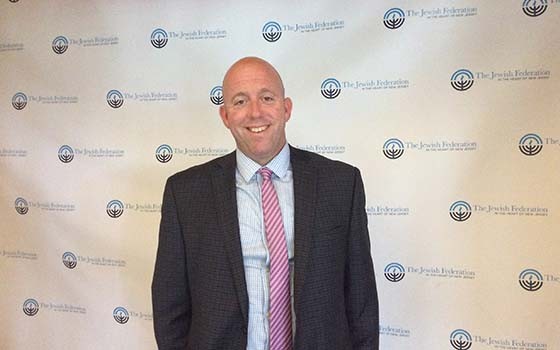
The following blog first appeared Friday, April 20, as an email update from Keith Krivitzky, CEO, the Jewish Federation in the Heart of New Jersey.
Dear Friends and Colleagues,
I had an idea that I wanted to share that has been brewing since Passover. However, before I do that I want to address some troubling news stories emerging from Barnard College and NYU, where students have recently voted to encourage divestment from companies that do business with Israel. I encourage you to read some of the articles covering these issues.
http://jewishweek.timesofisrael.com/jewish-identity-tested-in-new-nyu-tensions/
Not surprisingly, I find this highly troubling and one of the most disconcerting reasons is that many who voted for these resolutions are members of the Jewish community. Many of those Jews who did vote this way did so thinking this was an embodiment of their Jewish values and identity.
It makes you wonder why…and how things got this way. This is even more troubling to me after having spent time with non-Jewish clergy who bought into the understanding that things are complicated, and one-sided or overly simplistic approaches won’t work and can set back the cause of peace.
I want to share what I think is playing out; apologies that this isn’t a polished piece, but I think it is important that we identify the issues at play so that we can best address them.
1) Those who apply double-standards to Israel, the Jewish state, that they don’t apply more broadly to rogue states and human rights abusers think Iran, Yemen, Turkey…even Russia and China are either ignorant and caught up in the passion of someone else’s cause, or they are anti-Semites. With two exceptions if they are Palestinians…or they are Jews.
2) If they are Palestinian, things are more complicated. Palestinians buy into a different, and often contradictory (or mirror) narrative and they are victims (one can argue of or by whom). Which, to me, means two things. The first is that we should have more empathy for them and their situation, after all we too were strangers in a strange land. The second is that there will be those who view the conflict as a zero-sum game and others who are more pragmatic and pursue compromise; sadly, the extremists have had the louder voices.
3) If they are Jews…I think we have to face a failure of our Jewish community’s education and identity transmittal system. And while a lot of damage has been done, we need to try and address the underlying causes ASAP. Just what’s the damage? I’ve written about this before, but I believe there are many in our community, especially younger Jews, and perhaps more and more of our community who see their Jewish identity as reflected in universal values and ideals. This is in contrast to, or contradiction with a particular community or identity. Jewish values become subsumed (transubstantiated?) into a liberal, universal ethic and by extension anything particular, beyond nostalgic references like Jewish food or the hora, is “evil” or antiquated and should be distanced or disavowed. Hence Israel is based on an antiquated ideal and should be discarded.
Oy.
Can some of our fellow Jews really believe this? Yes. Clearly. These are not “self-hating” Jews; they see themselves as proud Jews standing up for their ideals. We just differ on the “Jewishness” of those ideals. And the other question is why they are so passionate in their rejection of Israel? Could there are other psychological dynamics at play? Probably.
Which brings me to what I originally wanted to write about. I’ve been thinking of the discussion of the 4 children during the Passover seder. I think those of us involved in the Jewish community often think of ourselves as the wise child. And when we think about or approach people who are not involved or, as in the situation described above, those who may not be in the Israel camp we think of them as the wicked child. Not that there aren’t wicked children or problematic people out there…but I think the better analogy is to think of them as the child that doesn’t know how to ask. Not only do they often not have the knowledge or experience to understand, an approach that assumes the same frame of reference will backfire.
One of the biggest shifts those of us working in the Jewish community need to make is to focus more of our efforts on speaking to the children who don’t know how to ask. Whether we are talking about our work to engage young families, programs through and with synagogues or trying to build connections with Israel I think this shift in perspective and approach is essential for us reaching those currently not connected.
Lots of food for thought.
And before I get to our reads for the weekend, I want to acknowledge some of the important steps the Jewish Federation and our partners have been taking to expand our reach in the community from sponsoring three powerful Holocaust Remembrance Day programs, to Israel Remembrance/Independence Day celebrations this past week that attracted close to 400, to a JServe program for teens this Sunday which we are expecting to touch 200 teens, to an amazing array of Israel @70 programs in the next few months. We are working hard to have a positive impact in our community and I want to thank our donors and contributors for your support.
And now, check these out:
- Something to celebrate: https://www.bloomberg.com/view/articles/2018-04-19/independence-day-israel-s-first-70-years-surprised-the-world
- Who would have thunk?: https://www.timesofisrael.com/how-a-jewish-civil-rights-group-became-a-villain-on-the-far-left/
- Um. Yes: https://www.timesofisrael.com/yair-lapid-benjamin-netanyahu-is-no-longer-a-defender-of-israeli-democracy/
- Where did the narrative go wrong: https://www.algemeiner.com/2018/04/18/new-york-times-greets-israels-70th-with-piece-claiming-1948-was-catastrophe/
- Repost one of the most important reads of the year: http://www.spiked-online.com/newsite/article/why-do-you-hate-israel/21297#.Ws9q6ob3bYX
- What you need to know about Syria: https://www.theatlantic.com/international/archive/2018/04/syria-chemical-weapons/558065/
Best for a Shabbat Shalom!
